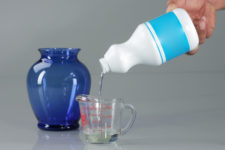Australian ‘Church’ Fined for Selling Bleach as a Coronavirus Cure

If you thought Donald Trump spouting the potential health benefits of disinfectant to cure the coronavirus was ridiculous, a church in Australia has just been fined more than $150,000 for selling a concoction called Miracle Mineral Solution (MMS).
In a surprising twist, it’s since been reported that the US leader of Genesis II, Mark Grenon, actually wrote to Donald Trump just days before the US president claimed that disinfectant could be a possible cure for coronavirus.
The Genesis II Church of Health and Healing has been selling MMS for years, claiming chlorine dioxide is a “miracle cure” that can treat autism, acne, HIV, cancer, diabetes and now COVID-19.
People have been hospitalised
But MMS is not approved for human consumption in Australia.
Both the Therapeutic Goods Administration (or ‘TGA’, a regulatory body within the Federal Department of Health) and the Victorian Department of Health have been engaged in a long running battle to have the preposterous health claims of MMS dismissed. But the fight came to a head following a recent investigation by the ABC’s 7.30 programme, after which the TGA issued 12 infringement notices totalling $151,200 to the church, for unlawfully advertising of Miracle Mineral Solution and other medicines.
According to the TGA’s website, four people were hospitalised in Victoria in 2014 after using the product. The body has also warned that there is no clinical, scientifically-accepted evidence showing the solution could cure or alleviate any disease, and that the use of the solution “presents serious health risks, and can result in nausea, vomiting, diarrhoea and severe dehydration.”
In response to the television programme and subsequent action, the administrator of the website set up to sell MMS, Charles Barton, who claims to be a Bishop of the Genesis II Church, published:
‘Attack on freedom of expression and freedom of religion in Australia’
“We have no comment, except to point out that this is a shocking and egregious attack on freedom of expression and freedom of religion in Australia.”
The website has been taken down and the TGA has updated its own warnings about MMS, stating that MMS is marketed as water purification drops and may be offered under different names, including Miracle Mineral Supplement.
MMS contains 28% sodium chlorite, a chemical used as a textile bleaching agent and disinfectant. Products containing this concentration of sodium chlorite pose a serious health risk if consumed by humans and should, under Australian law, be labelled with warnings and the word ‘POISON’.
Late last month, the American regulator, the FDA, obtained a temporary injunction in the Florida District Court, stopping the church in the US from selling MMS.
Are the fines sufficient?
Given the seriousness, and potentially fatal consequences of marketing this very dangerous product to gullible and desperate people as ‘medicine,’ particularly at a time of global pandemic, many are now questioning whether the fines are justifiable or whether more serious action should be taken.
The Therapeutic Goods Act 1989 is Commonwealth legislation which sets out the legal requirements for the import, export, manufacture and supply of therapeutic goods in Australia. It also details the requirements for listing, registering or including medicines, medical devices and biological products on the Australian Register of Therapeutic Goods (ARTG), as well as many other aspects of the law including advertising, labelling, and product appearance.
Contained within the Act are options for the TGA to take legal action, instead of simply issuing infringement notices, these include:
Injunctions
The TGA can seek injunctions from the Federal Court or the Federal Circuit Court to:
- restrain an entity from contravening the Act or the regulations, or
- compel compliance with the Act, or regulations if an entity refuses or fails to comply.
- Interim injunctions are also an option available to the TGA.
Civil penalties
Civil penalities enable the TGA to apply to the Federal Court for an order against an entity to pay a penalty for breaching the Act. If the Court is satisfied of the non-compliance, it may order that the entity pay the penalty.
Criminal charges
Serious non-compliance may warrant criminal proceedings. There are a range of criminal offences contained in the Act where this may apply. For criminal charges to be laid, the TGA needs to prepare a brief of evidence for the Commonwealth Director of Public Prosecutions (CDPP) which will determine the appropriate course of action.
Criminal penalties can include between 5 and 7 years imprisonment and fines of up to 4,000 penalty units for entities. Under commonwealth legislation the value of a single penalty unit is $210.00.







